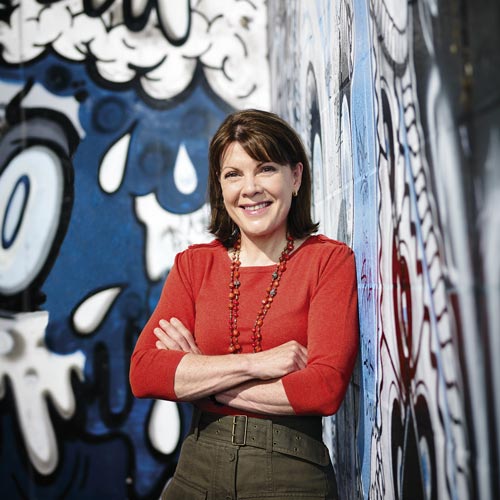Community Connections
Taking a real break this Easter
Time with family and friends, bright sunshine, spiritual reflection and celebration, and a possible visit from a chocolate-bearing rabbit – this Easter weekend has it all. And in addition, it brings a valuable and much-needed opportunity for us all to take a real break, says Professor of Psychology Dr Debra Rickwood.
Taking a break isn’t just important, Debra says – it’s crucial, especially at the point of history we’re living in.
“The human body is basically designed for short bursts of stress – which is why you have the fight-or-flight response as a survival mechanism, but once the threat is over, you come back to a baseline,” she says. “The way most of us live today though, there’s rarely a time that we really switch off – there is always one more thing to do.”

And always, five more minutes to (doom)scroll – through news of the COVID-19 pandemic, Russia’s invasion of Ukraine, the ongoing effects of climate change … “And now,” says Debra, “We also have an election to think about.
“There is a host of serious, intractable issues to be concerned about, and it’s hard to look away from them when we are so hyper-connected digitally. We live in a time of the perfect [stress] storm – and basically, if we are always operating at this constant high level of stress, we increase our allostatic load.”
The allostatic load is the cumulative weight of chronic stress and life events, which involves our physiological systems interacting and reacting to this stress. When the stressors and challenges get too much to cope with, allostatic overload is the result.
“If you’re in that constant state of reactivity to stress, you’re also living in a constant fight-or-flight state and that affects not only mental health, but physical health as well,” Debra says.
The psychological and physiological effects of stress are well-documented, but here’s a reminder anyway: in the short term, a spectrum of symptoms ranging from irritability to headaches to panic attacks and feeling overwhelmed. In the long term, Debra says that prolonged chronic stress can lead to mental health problems and more serious physical illnesses like immune system issues or high blood pressure leading to an increased risk of strokes and heart disease, to name a few.
While regular breaks on a daily and weekly basis are important, Debra says that the Easter holidays offer a chance to get a deeper and more restorative rest.
“It’s an opportunity to address the stress levels we are all facing in a meaningful way,” she says. “With the school holidays now on and ANZAC Day around the corner, I know a lot of people who are taking a bit of a longer break – but even the four-day weekend is a really worthwhile break.”
“It’s coming at an ideal time too, as many of us started the year off at a gallop.”
To make the most of your Easter break, Debra has a few key tips:
Be very intentional about taking a break. “I think sometimes we feel a bit guilty about taking a break, and that is a mindset that needs to change,” Debra says. “You need to tell yourself that you are taking a break because you deserve one and it’s really the right thing to do – and being intentional about it will help you stick to it, and sink into some well-earned rest.”
Plan your fun – planning may not be the first thing that strikes you as relaxing, but it lends itself to the whole approach of being intentional. “What rest looks like is going to differ for each of us, but many of us are planners and have our to-do lists – and we don’t operate well in a vacuum of time,” says Debra. “You should plan something that you truly enjoy doing, and that is a bit different from what you usually do, to take yourself out of our own head – don’t plan something that isn’t work but that you think you should be doing … and then may feel resentful about. I’m personally not planning any cooking or housework for all four days!”
Step away from the keyboard. “I know that many academics especially look at the upcoming long weekend and think ‘Ah, four days to catch up on my work!’” says Debra. “But no, the work will still be there once you come back next week, and you’ll be sharper and more productive if you take the down time.”
(But, if you find that there is some urgent work that will hang over you and stress you out further unless you get it done, then again, be very intentional. “Set aside no more than two hours, for instance, on the Friday and get it done – make sure you stick to that timeframe,” Debra says.)
Put your devices down. “Lock them in a cupboard! At least for part of the time you’re off, if you can’t manage it for four days,” Debra says. “And no doomscrolling!”
Put your out-of-office message on. It’s the email equivalent of the ‘Gone Fishing’ sign on your door, and will feed into you being intentional about your rest.
Get outside. “After so much rain, the weather this weekend is going to be amazing – at least that’s what the forecasts say. So get out into the sunshine and enjoy the autumn colours, whether it’s a walk at the Arboretum or you pile the whole family into the car and go to Kosciuszko National Park.”
Be present. “This can be a huge challenge because of the way we live today – we’re addicted to distraction, and some of us have lost the ability to be present,” Debra says. “Try a handy grounding technique – wherever you are, pay attention and consider what are: five things you can see, four things you can hear, three things you can smell, two things you can touch and one thing you can taste. It’s a way of reengaging your senses and situating yourself in the present, and it’s also really helpful when you’re stressed.”
For her own Easter break, Debra has a very specific plan in mind – “To take my own advice!” she says, and have a very deliberate, well-deserved and healing break.
Have a wonderful Easter break everyone – you deserve it!
Words by Suzanne Lazaroo. Photos: supplied and sourced.